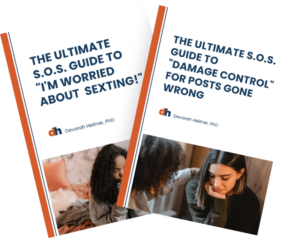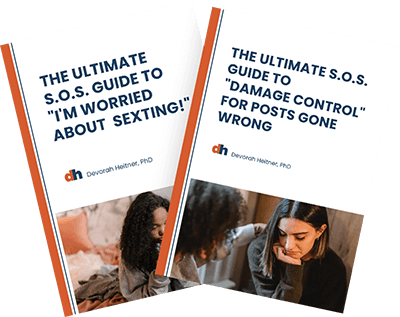“Someone posted something really mean about another kid in our group chat.”
Has your child ever said this to you? If she has, two things:
- High-five! This is what great parents are made of – your kid trusts you and can open up to you about this stuff.
- You probably stopped whatever it was you were doing, put your phone down, closed your laptop, and looked your child in the face to start a conversation.
Before we get into how to set your kids up for success in navigating these situations, here are some questions to ask your child:
- What did you see?
- How did this make you feel?
- How did it make others feel?
- What did you do next?
- Would you do anything differently?
Ask these questions from a place of curiosity. You’re not being accusatory here. Just listen to them.
Once you understand what your child heard or saw, your next step is to empower her to speak up next time, and every time. Let her know in a positive way that she has control over her reaction and permission to say something whenever something isn’t right. Let her know that even though standing up for herself or others and speaking up might feel uncomfortable, you believe that standing up for yourself and others is always the best choice.
“Upstanders” Need a Good Role Model – You!
Mentorship is critical in issue of digital citizenship. Your kids are watching what you say and do. Treat this as an opportunity to “ambiently” instill your values in them. In other words, be an upstander yourself!
Show them that you stand confidently in your values and opinions, even if they could be considered unpopular. When you’re assertive, your children are more likely to be assertive as well. This also means when you tell your child “no” you need to stick to it.
Here are some responses you can share with your children, depending on their age and maturity level, to respond to inappropriate and unkind behavior.
Preschool to primary grades
We can teach our younger children about boundary setting and speaking up early on. At this age, it’s completely acceptable that adult authority is huge, so having them put the focus on how you will react can help get them in the habit of saying something as they get more comfortable feeling empowered.
Here are some responses for preschoolers and primary gradeschoolers:
- If you keep doing that, my mom won’t let me play with you anymore
- We’re not supposed to be doing that / looking at that / saying things like that
- That’s inappropriate
- We’re both going to get sent to the Principal’s office if you keep doing that
- That’s not safe; I’m getting our teacher/my mom / my dad / my caretaker
- Let’s do something else/or “I’m going to do something else” and then walk away
5th-7th grade
In 5th grade and middle school, your children could be exposed to games and images that are inappropriate on laptops, tablets, and phones. They may need help setting boundaries with friends, so it’s still perfectly acceptable for a middle schooler to cite their parents as a reason to avoid certain websites, language or behavior. You can have your kids point their finger at you as they get used to standing in their own convictions and feeling safe in their values. At this age, they can also start to stand up for their time and integrity.
Arm your preteen with these statements to help prepare them to stand on their own:
- If you keep watching stuff like that, my parents won’t let me invite you over
- Let’s find something better to watch/do
- Please don’t text me after 9 pm or I’ll get in trouble
- I have to set my status to do not disturb while I’m doing my homework, so you won’t see me in the group text/game/on Snapchat, etc.
- I heard about this new game [game you both agree is appropriate], let’s play that instead
- [Friend’s name] would be hurt if they heard you say that
- Dude, that’s not even funny
8th grade and beyond
At this age, kids have more control over their environment and may have a fair amount of peer time with no adults around. They’ll need to set their own physical and digital boundaries and know that they can just leave if they get too uncomfortable or the situation becomes too inappropriate.
At an age where kids feel constant pressure to fit in, you can help them feel confident in setting up their boundaries.
- When you send me 20 texts in a row, I don’t respond any quicker
- Hey, that’s just gross, don’t show me that stuff anymore
- I’m saving myself for actual sex, so no I don’t want to watch porn with you
- I’m taking a break from that app. Not my thing.
- I don’t want to share a picture like that – I’d prefer to be known for my fabulous (writing/soccer playing/joke-telling/debate skill) self
For kids who are dating, the frequency of digital connection is likely something they will need to negotiate and agree on. Otherwise, expectations can be very uneven. This is a path toward hurt feelings.
Setting Boundaries: Kids Sometimes Think It’s “Being Mean”
Let your kids know it’s OK and even necessary to set boundaries. When we show our children that it’s OK to have boundaries, we’re giving them the tools they need to help build their confidence in standing up for what and who they believe in. This should extend from real-world interactions into online relationships, in social media, and in online games, too. Sometimes our kids should stand up, and sometimes it’s OK just to get out.
Our children also need to know that if a conversation on social media, chat, or texting thread has veered into harassment or hateful speech, finding a way out of the conversation is imperative. They won’t want to be associated with the discussion if it becomes more public – for instance, as part of a disciplinary or legal process.
Sticking up for a friend or a teacher in your own social circle makes sense. Taking on a public mob for their racist or homophobic comments in a digital setting may not make sense – there are often better ways to contribute to the conversation.
What Works for You and Your Family?
What kinds of conversations have you had with your kids? Do you have any other scripts your kids use that have worked well?
If you found this helpful, you also might enjoy how to handle exclusion in the Instagram age and how to handle conflict in the digital age.
Worried about tough topics like sexting or a post that could damage your child’s reputation? Get my FREE “SOS GUIDES”


